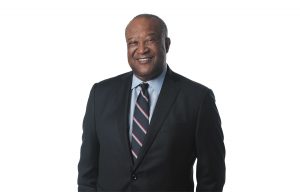Subscriber Benefit
As a subscriber you can listen to articles at work, in the car, or while you work out. Subscribe Now
Taft Stettinius & Hollister LLP
Indiana University Robert H. McKinney School of Law, 1981
Why did you decide to enter the legal profession?
Mine was not a typical path. At the age of 7, I witnessed my father being detained by the police following an incident in our neighborhood. We found ourselves in need of an attorney and hired attorney Frank Hughes, who went on to serve as the Circuit Court judge for Marion County. The charges were ultimately dismissed, but I remember the impact Judge Hughes had on our family during a very traumatic time. He stayed in touch with us throughout his life and submitted a letter of recommendation on my behalf when I applied to law school. His influence on my life and my family’s well-being shaped my career choice.
What does “diversity, equity and inclusion” mean to you?
Embracing diverse perspectives, cultures and life experiences.
How did you get involved in DEI work, and why have you stuck with it?
I was born into it and it is a constant part of my being. Not just because of race, but also economics and cultural differences.
What would you say to someone who perceives “DEI” as a business “buzzword”?
It has evolved and continues to evolve because of the ever-changing differences and similarities that drive our economics in a capitalist society.
What is the most significant change you’ve seen in the legal profession since you began your career?
The expansion of the pool of women and minorities in the legal profession.
What’s the best advice you’ve ever received?
Treat people the way you want to be treated. I heard this in Sunday school lessons, but Congresswoman Julia Carson lived it. I aspire to walk in her footsteps with each and every interaction.
How do you spend your free time?
My wife, Patty, and I have a son, Lacy III, who lives nearby, and we’re blessed with five grandchildren and one great-grandchild. The majority of my free time is spent with my family and working with community organizations, including the Indiana University Foundation, Congressional Black Caucus, Madam Walker Legacy Center, NAACP, IndyGo, the Indianapolis Airport Authority — and various publicly traded corporate boards.
What was your favorite — and least favorite — class in law school?
Favorite: Property Law. Least favorite: Criminal Law.
Do you have a proudest DEI accomplishment?
My wife and I are deeply committed to diversity efforts at Indiana University and have supported the university’s efforts and the enhancement of the university’s cultural climate, including scholarships and programming that promote inclusive and welcoming campus environments. Our support is also earmarked to benefit faculty, staff, and underrepresented, first-generation, LGBTQ+ and ethnic minority students in the continued development of academics, leadership and training focused on diversity and issues that affect underrepresented populations at IU.
Why is mentorship of young lawyers, particularly those from underrepresented backgrounds, important to you?
My life has been enriched by my experiences and by those I have met throughout my career. Many have served as important mentors to me through the years. Those mentors have come from all walks of life, including Sunday school teachers, athletic coaches, classroom teachers, neighbors and colleagues. All of us have opportunities to mentor others, and we often don’t even realize our influence on others we help.
Please enable JavaScript to view this content.
